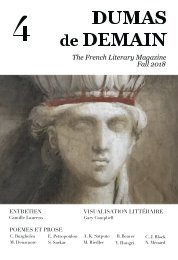Dumas de Demain: The French Literary Magazine Vol. 7
Create successful ePaper yourself
Turn your PDF publications into a flip-book with our unique Google optimized e-Paper software.
interlocutors. I also surmise that in order to historicize and
genealogize philosophy Aristotle had to involve a patricide in the
story, which he did reluctantly and indirectly with the figure of
Socrates, and bluntly with all philosophers past, present, and
future, including himself, as he renounced the belief that
philosophy could be a ticket for immortality” (Chapter 8, pg 165).
Do you believe this severance of conversational ties led to more civil
understanding or more hostile disagreement among Aristotle’s
successors? What impact, if any, do you believe this philosophical
historicization had on writers of fiction and stories based on
philosophical figures?
My hunch is that Aristotle's gesture in creating a genealogy of
philosophers led to more passionate disagreements, but also more
passionate loyalties. It is so hard to figure out how the Pre-Socratic
philosophers behaved toward each other since the little we know
about them is filtered through Aristotelian lenses that I would hesitate
to say all was idyllic or less emotional before. I want to add
something that I may not have sufficiently underscored in my book:
the change in the status of the philosopher and the imagined relations
between philosophers across time does not result from something
Aristotle did entirely knowingly and all alone. It results from a
complex relational network involving the Sophists, Socrates, Plato,
and Aristotle. Before them (that is before the 5th c BC), I am not sure
that there were any written narratives about philosophical figures.
Perhaps lore, stories, legends about semi-mythical figures that were
not even called philosophers (Pythagoras, Empedocles, etc.). If I am
right on this, one could claim that Aristotle (continuing and
responding to the Sophists, Socrates, and Plato) made philosophers
legible and writable.
6. You talk about how Roscelin and Abelard, despite their
differences and disagreements, understood each other’s position
and recognized that they came from different circles. Indeed, “ideas
do not reflect a personal, individual choice; they represent the
adherence of an individual to a group. In this regard, Roscelin and
Abelard were perfectly of their times and perfectly understood one
another” (Chapter 8, pg 189). In your opinion, how would Roscelin
and Abelard view and respond to (if at all) the lack of
Septième édition | 9









